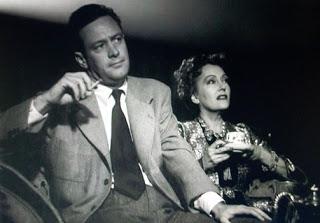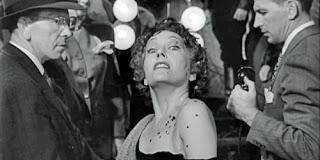
"No one leaves a star. That's what makes one a star!"
Hollywood loves showing itself as a soul-destroying wasteland, endless repeating the message in films satirical and serious. Billy Wilder's Sunset Boulevard (1950) remains the best, transforming a familiar subject into high tragedy.Hack screenwriter Joe Gillis (William Holden) flees creditors into the arms of Norma Desmond (Gloria Swanson). An aged silent movie actress, she lives in a mansion with her servant Max (Erich Von Stroheim), still convinced she's a star. Norma enlists to Joe to write her comeback vehicle, but their relationship grows uncomfortably close. Eventually Joe tires of the arrangement, sneaking away to help Betty (Nancy Olson) write a script. When Norma finds out, she loses her mind.
Like many Wilder films, Sunset Boulevard defies categorization. His razor-sharp wit provides droll humor, with Joe's hardboiled narration and sarcasm off-setting the grimness. Boulevard's black satire shows Joe begging for work while his agent (Lloyd Gough) golfs and producers lounge around ornamented offices. For verisimilitude, Cecil B. DeMille, Buster Keaton, Anna Q. Nillson and Hedda Hopper contribute cameos.
Along with cowriters Charles Brackett and D.M. Marshman Jr., Wilder's more ruthless than affectionate. Aside from Betty, a failed actress eager to climb the ladder, Boulevard's characters are desperate or delusional, broke or bonkers. Joe goes from reluctant screenwriter to glorified gigolo. Max, a director ruined by Norma and eclipsed by De Mille, debases himself as a servant. Wilder's Hollywood is a cutthroat business, frightening outsiders and eating its own.
And Norma is ;its ultimate victim. She never outgrew her silent stardom, ruined by talkies and age. Discarded by Hollywood, patronized by friends and enabled by Max, she cocoons herself in memories: endless photos, a collection of her films, phony fan mail. She's pathetic yet frightening, so obsessed with image that she can't face reality. When Joe tries penetrating her delusions, he only triggers tragedy.

Sunset Boulevard often resembles a horror movie, infused with sick humor. Norma's rotting, oversized estate plays host to bizarre events; she and Max hold an elaborate chimp funeral; she impersonates Chaplin in a grotesque vaudeville act; an orchestra plays to an empty party. Joe's narration and John F. Seitz's photography provide a noir feel, but Wilder's puckish weirdness keeps viewers off-balance.
William Holden went from pretty boy to heavyweight with his faultless performance. Slimy, desperate and charming, Holden was never better. Erich Von Stroheim's grave, wounded dignity makes a flawless foil; certainly he understood an aged director gone to seed. Nancy Olson's freshness offsets the desperate or deranged leads. Jack Webb, unusually likeable, plays Betty's chummy fiancée.
In the end, Norma finally gets her audience: peeping newsreels, gawking reporters, policemen waiting to arrest her. With Max directing she descends a staircase, Franz Waxman's score swelling. Norma's face locks into a snarling rictus, reaching into the camera like a monster. Few films offer a more disturbing, memorable conclusion.

